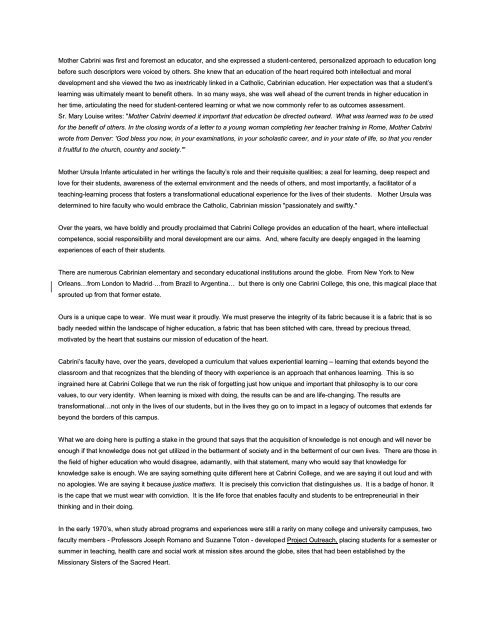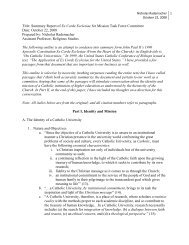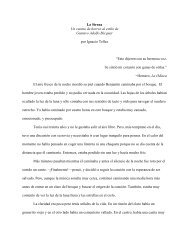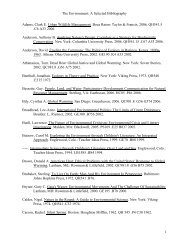Dr. George Inaugural Address - Cabrini College
Dr. George Inaugural Address - Cabrini College
Dr. George Inaugural Address - Cabrini College
Create successful ePaper yourself
Turn your PDF publications into a flip-book with our unique Google optimized e-Paper software.
Mother <strong>Cabrini</strong> was first and foremost an educator, and she expressed a student-centered, personalized approach to education long<br />
before such descriptors were voiced by others. She knew that an education of the heart required both intellectual and moral<br />
development and she viewed the two as inextricably linked in a Catholic, <strong>Cabrini</strong>an education. Her expectation was that a student’s<br />
learning was ultimately meant to benefit others. In so many ways, she was well ahead of the current trends in higher education in<br />
her time, articulating the need for student-centered learning or what we now commonly refer to as outcomes assessment.<br />
Sr. Mary Louise writes: "Mother <strong>Cabrini</strong> deemed it important that education be directed outward. What was learned was to be used<br />
for the benefit of others. In the closing words of a letter to a young woman completing her teacher training in Rome, Mother <strong>Cabrini</strong><br />
wrote from Denver: 'God bless you now, in your examinations, in your scholastic career, and in your state of life, so that you render<br />
it fruitful to the church, country and society.'"<br />
Mother Ursula Infante articulated in her writings the faculty’s role and their requisite qualities; a zeal for learning, deep respect and<br />
love for their students, awareness of the external environment and the needs of others, and most importantly, a facilitator of a<br />
teaching-learning process that fosters a transformational educational experience for the lives of their students. Mother Ursula was<br />
determined to hire faculty who would embrace the Catholic, <strong>Cabrini</strong>an mission "passionately and swiftly."<br />
Over the years, we have boldly and proudly proclaimed that <strong>Cabrini</strong> <strong>College</strong> provides an education of the heart, where intellectual<br />
competence, social responsibility and moral development are our aims. And, where faculty are deeply engaged in the learning<br />
experiences of each of their students.<br />
There are numerous <strong>Cabrini</strong>an elementary and secondary educational institutions around the globe. From New York to New<br />
Orleans…from London to Madrid …from Brazil to Argentina… but there is only one <strong>Cabrini</strong> <strong>College</strong>, this one, this magical place that<br />
sprouted up from that former estate.<br />
Ours is a unique cape to wear. We must wear it proudly. We must preserve the integrity of its fabric because it is a fabric that is so<br />
badly needed within the landscape of higher education, a fabric that has been stitched with care, thread by precious thread,<br />
motivated by the heart that sustains our mission of education of the heart.<br />
<strong>Cabrini</strong>’s faculty have, over the years, developed a curriculum that values experiential learning – learning that extends beyond the<br />
classroom and that recognizes that the blending of theory with experience is an approach that enhances learning. This is so<br />
ingrained here at <strong>Cabrini</strong> <strong>College</strong> that we run the risk of forgetting just how unique and important that philosophy is to our core<br />
values, to our very identity. When learning is mixed with doing, the results can be and are life-changing. The results are<br />
transformational…not only in the lives of our students, but in the lives they go on to impact in a legacy of outcomes that extends far<br />
beyond the borders of this campus.<br />
What we are doing here is putting a stake in the ground that says that the acquisition of knowledge is not enough and will never be<br />
enough if that knowledge does not get utilized in the betterment of society and in the betterment of our own lives. There are those in<br />
the field of higher education who would disagree, adamantly, with that statement, many who would say that knowledge for<br />
knowledge sake is enough. We are saying something quite different here at <strong>Cabrini</strong> <strong>College</strong>, and we are saying it out loud and with<br />
no apologies. We are saying it because justice matters. It is precisely this conviction that distinguishes us. It is a badge of honor. It<br />
is the cape that we must wear with conviction. It is the life force that enables faculty and students to be entrepreneurial in their<br />
thinking and in their doing.<br />
In the early 1970’s, when study abroad programs and experiences were still a rarity on many college and university campuses, two<br />
faculty members - Professors Joseph Romano and Suzanne Toton - developed Project Outreach, placing students for a semester or<br />
summer in teaching, health care and social work at mission sites around the globe, sites that had been established by the<br />
Missionary Sisters of the Sacred Heart.






